 Michael Cory Davis, a native New Yorker, born in Brooklyn re-located to Los Angeles to pursue his career as what he terms a “Triple Threat” —actor, writer, and director.
Michael Cory Davis, a native New Yorker, born in Brooklyn re-located to Los Angeles to pursue his career as what he terms a “Triple Threat” —actor, writer, and director.
Michael has starred in numerous commercials, print campaigns and independent films, many of which have won numerous awards. He also had a recurring role on the daytime soap opera, The Bold & the Beautiful and starred in six high rated films for the sci-fi channel.
In 2003, while starring in two feature-length films in Sofia, Bulgaria, Michael learned of the growing number of young girls and women forcefully taken from Bulgaria and other Balkan countries and exploited as prostitutes. Devastated by a 13-year old Bulgarian girl’s story of being abducted, Michael was inspired to write and direct Svetlana’s Journey by joining forces with Face to Face Bulgaria, the Bulgarian Annex of the United Nations Face to Face International, an agency created to stop human trafficking and promote equal rights for women. This film marks Michael’s directorial debut.
Bijan Tehrani: How and where for the first time you encountered with the issue of human trafficking?
Michael Cory Davis: I first learned about sex trafficking in Bulgaria. I was starring in a film shooting in Sofia, Bulgaria in 2003. I 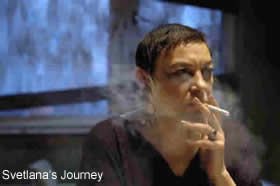 had a chance to taste a slice of celebrity stardom because I was recognized by their press for some daytime soap-opera work that I have done in the states. I was invited by a Non-Government Organization to attend a fundraiser about the crime of human trafficking in their country. I learned very quickly that many of the poorer countries in the Balkans are severely suffering from this crime and many of the young women are duped and forced into prostitution. I traveled the country meeting many victims and truly gained a hand’s on experience of what this crime can do a person’s soul.
had a chance to taste a slice of celebrity stardom because I was recognized by their press for some daytime soap-opera work that I have done in the states. I was invited by a Non-Government Organization to attend a fundraiser about the crime of human trafficking in their country. I learned very quickly that many of the poorer countries in the Balkans are severely suffering from this crime and many of the young women are duped and forced into prostitution. I traveled the country meeting many victims and truly gained a hand’s on experience of what this crime can do a person’s soul.
Bijan: It is been said that after coming back from Bulgaria, you noticed that something has changed inside you and you are no longer just a Hollywood actor, tell us more about this issue please.
Michael: A Hollywood actor nowadays is less about substance and more about surface, or at least glamorized 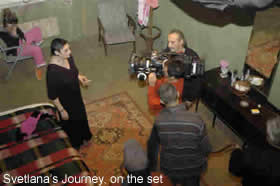 by the press for that. I was not raised to appreciate the externals of life but to value the internal. This crime of trafficking that I was exposed to really put the magnifying glass on the values of self and true self-worth. At the time when I returned to L.A after meeting those battered children I continued working in various Chic Hollywood nightclubs as a bouncer. I couldn’t make sense of the over indulgence of wealth just for showing off purposes that I saw nightly with celebrities and wanna-be’s especially juxtaposed with my experience with poverty stricken children forced to prostitute.
by the press for that. I was not raised to appreciate the externals of life but to value the internal. This crime of trafficking that I was exposed to really put the magnifying glass on the values of self and true self-worth. At the time when I returned to L.A after meeting those battered children I continued working in various Chic Hollywood nightclubs as a bouncer. I couldn’t make sense of the over indulgence of wealth just for showing off purposes that I saw nightly with celebrities and wanna-be’s especially juxtaposed with my experience with poverty stricken children forced to prostitute.
That is how I was inspired to write Svetlana’s Journey. One night I had lucid distaste of everyone around me in the V.I.P area that I was monitoring after a pseudo- star spent 30,000 dollars in the nightclub on liquor and cigars, trying to show off to a group of hanger on gold diggers. I realized how fortunate and wasteful we are of every resource we have, including our own worth.
The children in Bulgaria and around the world learn this way of life through our media and I knew that the only way the children could understand what this life of prostitution really is, is if I showed it to them in a real way.
Bijan: Why you decided to go back to Bulgaria? Is it true that you had only $200 in your pocket when you board the plane to Sofia? 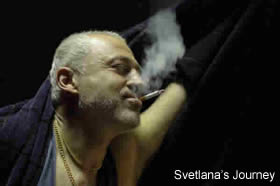
Michael: Yes this is very true. This is the money that I had after that weekend of work. I had to go back and shoot the film. I read the scri pt that night when I wrote it and said, dayumm, this is good. This is real good. It was good because I felt it. It came from a source of passion, outrage, and compassion. When I got back to Bulgaria I told representatives from the Face To Face organization, I don’t know how we’re going to shoot this film because I know you guys are just as broke as me, but we are going to produce this film and get it on tv and use it as a tool to spread awareness to every kid in every village in your country.
Bijan: How was this second trip to Bulgaria, comparing to the first one?
Michael: The second trip was just as great. I pimped myself out as an actor/model and did every kind of print campaign or film that I could, to raise money and re-invest in the making of Svetlana. I built up a pretty damn good actors reel in the process. I had great fun. I love traveling and I think I was a European in some other life, minus the cigarette smoke I am sure:) I had my own apartment and at many points contemplated never, ever, ever coming back to America. It didn’t hurt that the food was dirt cheap… but alas the Euro is there soon and things are changing rapidly:(
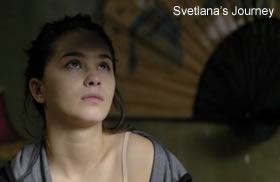 Bijan: How Svetlana’s Journey was received by the audiences inside and outside Bulgaria?
Bijan: How Svetlana’s Journey was received by the audiences inside and outside Bulgaria?
Michael: Svetlana was received very well in Bulgaria. It was aired on their national television station to over 2 million viewers. There are seven million people in the country. The goal wasn’t celebrity-esque recognition even though that happened immensely when the film aired, but what mattered was how the target group, the children felt about the film.
I am very pleased that after viewing the film I had boys and girls crying and scared straight! I believe that this is very important as I didn’t want to sugar coat anything about the experience Svetlana had. I kept it very true to her time in the brothel. In the United States the movie has had a great run. Again, I didn’t have any intentions with putting in a festival. My friends saw the film at a screening and said to me, “Oh my god, Mike you shot a movie.. a real movie… you so have to put that in film festivals”
I was surprised when it won the Hollywood Film Festival and the HD Film Festival, because it was in Bulgarian language and longer than a typical short. The media has been very helpful in promoting Svetlana and Cargo and helping me get the message across. Svetlana has been a key tool in fighting trafficking, with a number of organizations and law enforcement agencies using it as a tool domestically and internationally.
Bijan: When and how did you come up with the idea of making the “Cargo: Innocence Lost”?
Michael: Cargo: innocence lost came about when I was traveling and screening Svetlana’s Journey. I appeared on CNN and my phone wouldn’t stop ringing from people representing organizations telling me about this happening here in America and no one taking notice. I took part in events that these domestic organizations invited me to and I learned about American children being forced to prostitute as well foreign nationals. I met a number of victims of the crime here and realized, if a movie helped the problem in Bulgaria, a movie can help the problem in America.
Bijan: How challenging was making a documentary in US about human trafficking?
Michael: Well no one from the government wanted to talk to me. I mean as someone stated to me, don’t Michael Moore me man! But after informing people of 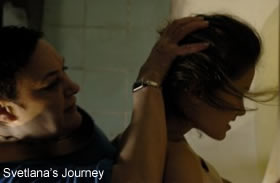 why I wanted to make the documentary everyone opened up fairly quickly. It didn’t hurt that I was on CNN and the officials in the film all realize that there is a lack of awareness about the problem and acknowledge the heavy role the entertainment industry plays in spreading information to the masses.
why I wanted to make the documentary everyone opened up fairly quickly. It didn’t hurt that I was on CNN and the officials in the film all realize that there is a lack of awareness about the problem and acknowledge the heavy role the entertainment industry plays in spreading information to the masses.
The biggest challenge was not having a lot of money and rushing to go into production. I decided to make the documentary the first week of December and then in the last week of January I was shooting. The most trying part was when my director of photography backed out three days before the shoot. Fortunately he was a true friend and suggested someone he felt would be better suited. Sometimes when things seem to fall away at the sides is when the most magic is happening. Pablo Bryant, turned out to be my director of photography and has now become a good friend. We worked very well as a team and without him I wouldn’t have the piece I have. We worked under a grueling travel schedule going seven cities in three weeks. Then I went back to Bulgaria where I did my post and shot the narrative, using the same director of photography of Svetlana’s Journey, Anton Bakarsky.
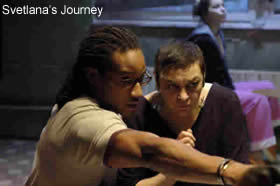 Bijan: In US public doesn’t have an idea of how deep human trafficking in US is, do you think your film has brought any awareness to this matter?
Bijan: In US public doesn’t have an idea of how deep human trafficking in US is, do you think your film has brought any awareness to this matter?
Michael: Hell yea my film has brought awareness. I have done events where people stay in the auditorium for three hours talking, debating, wondering how to fix the problem. I believe that whenever this film finds its way to speak to the masses everyone will be conscious and clear on what this crime is and what to do to stop it. I am learning the ropes on distribution and learning what the best way is to get it out there. I know that Hollywood prefers limited theatrical releases for films like this and for me that is wasteful minimizes the potential of informing Americans of the travesty. I have been implementing my own strategy of getting it out to the masses using churches, organizations, and universities. Fresh ideas come to me daily so I am always changing and morphing what I am doing.
Bijan: You managed to speak to the victims of human trafficking in US, please tell us about your experience.
Michael: My experience with the victims has been enlightening first off because of their resilience. I mean as an actor if I didn’t book an audition I’d weep all day and feel like the world was over… that kind of feeling changes after you hear a fifteen year old girl tell you about being raped 15 times a day but can still be happy to have the chance to be free and move on. I realize that money is not the issue of why this crime happens, it’s the surface issue. To me the real issue is the lack of any real appreciation for life. Humans have lost the consciousness behind loving anything else but oneself, which in turn directly hurts oneself. What kind of world do we live in where people use the desires of people who want a better life to imprison them?!
Bijan: Now you are not just a filmmaker, but you are also an activist trying to find solution for the human trafficking problem. Don’t you miss just being a 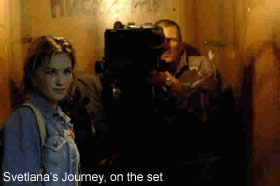 Hollywood actor/filmmaker with no worries about other people problems? Are you trapped by importance of the human trafficking issue, or there is joy in your commitment?
Hollywood actor/filmmaker with no worries about other people problems? Are you trapped by importance of the human trafficking issue, or there is joy in your commitment?
Michael: I find joy in many areas of my life. When I feel myself getting too dark within from working in this field I step out of it. I certainly do miss acting and look forward to that right role coming to me. I believe that after all that I experienced I have such an emotional depth within me that I can tap into far more so than when I was the actor dude who was focused on my biceps, my hair, and if I could memorize the lines. To be completely honest, the actor/filmmaker in me thrives off of the ills of the world, this is the main ingredient necessary for me to make my visual concoction of artistry. At the end of the day I believe as an artist I am supposed to observe, help, and display what the problems are in our society.
Bijan: Svetlana’s Journey will be screened at South East European Film Festival in Los Angeles, please give us  more information about your participation at this festival
more information about your participation at this festival
Michael: I am looking forward to this event as I believe it is a great way to encourage Americans to look at films beyond our own. I am still getting the details but I know my film will screen there and I will be there.
* To learn more about Michael and his films please check: http://www.michaelcorydavis.com/
* For more info about the South East European Film Festival in Los Angeles please check http://seefilmla.org/

